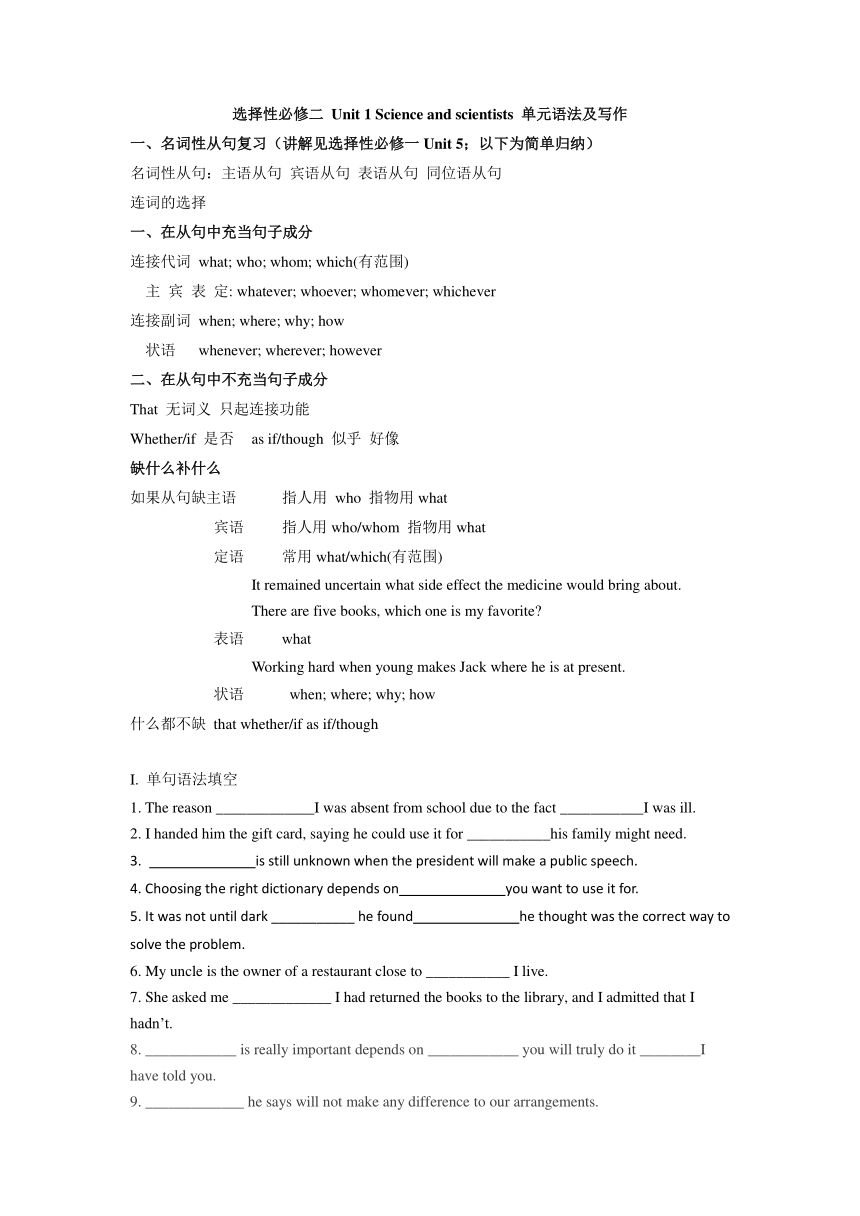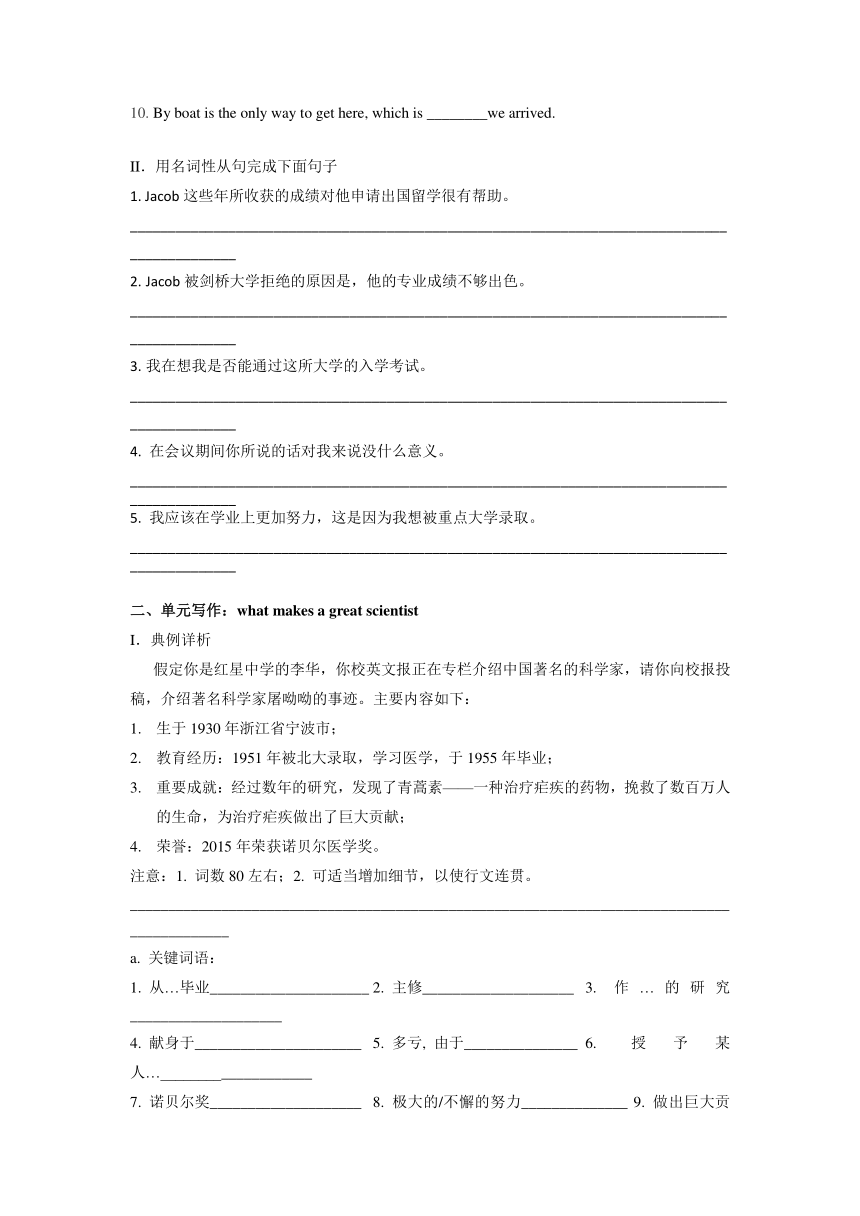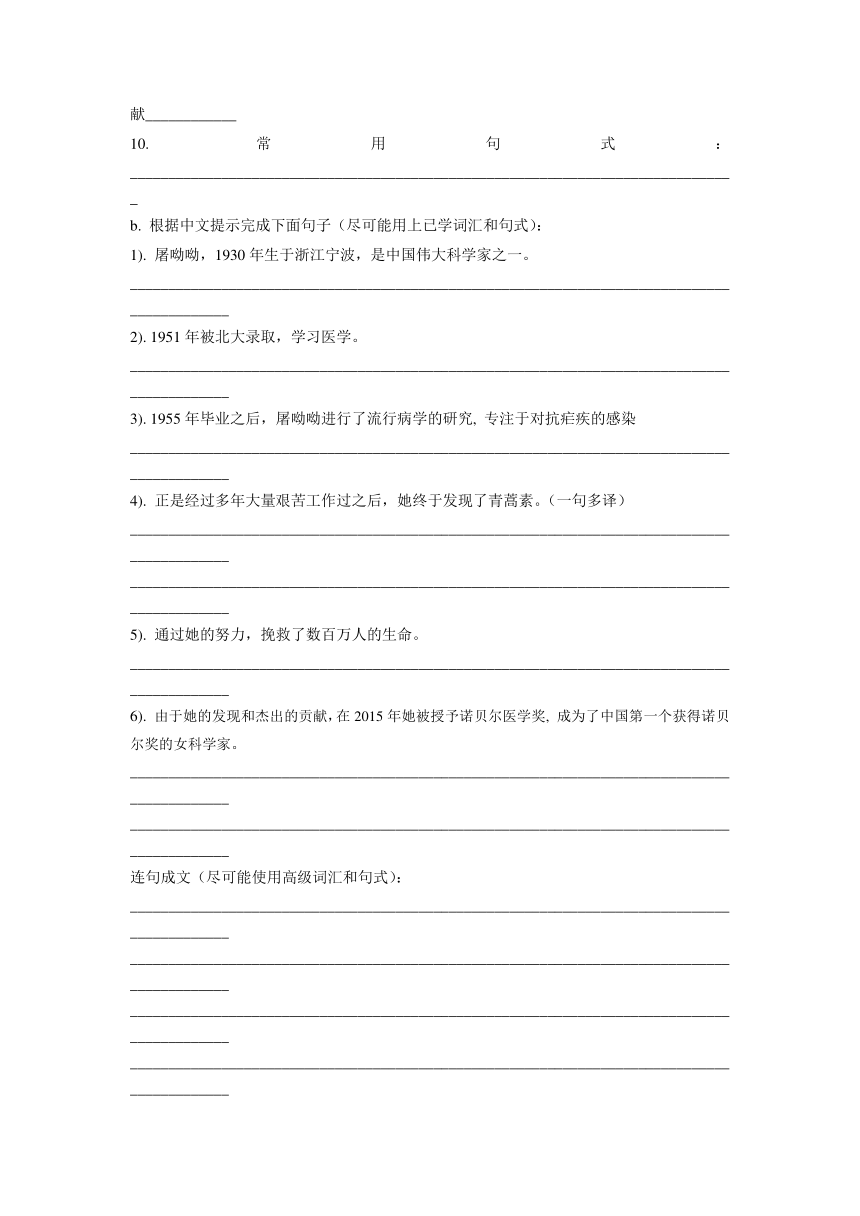人教版(2019)选择性必修 第二册Unit 1 Science and scientists-单元语法和写作(重难点词句语法)基础 提升练学案(含答案)
文档属性
| 名称 | 人教版(2019)选择性必修 第二册Unit 1 Science and scientists-单元语法和写作(重难点词句语法)基础 提升练学案(含答案) |

|
|
| 格式 | docx | ||
| 文件大小 | 21.8KB | ||
| 资源类型 | 教案 | ||
| 版本资源 | 人教版(2019) | ||
| 科目 | 英语 | ||
| 更新时间 | 2024-03-08 14:53:07 | ||
图片预览



文档简介
选择性必修二 Unit 1 Science and scientists 单元语法及写作
一、名词性从句复习(讲解见选择性必修一Unit 5;以下为简单归纳)
名词性从句:主语从句 宾语从句 表语从句 同位语从句
连词的选择
一、在从句中充当句子成分
连接代词 what; who; whom; which(有范围)
主 宾 表 定: whatever; whoever; whomever; whichever
连接副词 when; where; why; how
状语 whenever; wherever; however
二、在从句中不充当句子成分
That 无词义 只起连接功能
Whether/if 是否 as if/though 似乎 好像
缺什么补什么
如果从句缺主语 指人用 who 指物用what
宾语 指人用who/whom 指物用what
定语 常用what/which(有范围)
It remained uncertain what side effect the medicine would bring about.
There are five books, which one is my favorite
表语 what
Working hard when young makes Jack where he is at present.
状语 when; where; why; how
什么都不缺 that whether/if as if/though
I. 单句语法填空
1. The reason _____________I was absent from school due to the fact ___________I was ill.
2. I handed him the gift card, saying he could use it for ___________his family might need.
3. is still unknown when the president will make a public speech.
4. Choosing the right dictionary depends on you want to use it for.
5. It was not until dark ___________ he found he thought was the correct way to solve the problem.
6. My uncle is the owner of a restaurant close to ___________ I live.
7. She asked me _____________ I had returned the books to the library, and I admitted that I hadn’t.
8. ____________ is really important depends on ____________ you will truly do it ________I have told you.
9. _____________ he says will not make any difference to our arrangements.
10. By boat is the only way to get here, which is ________we arrived.
II.用名词性从句完成下面句子
1. Jacob这些年所收获的成绩对他申请出国留学很有帮助。
_____________________________________________________________________________________________
Jacob被剑桥大学拒绝的原因是,他的专业成绩不够出色。
_____________________________________________________________________________________________
我在想我是否能通过这所大学的入学考试。
_____________________________________________________________________________________________
4. 在会议期间你所说的话对我来说没什么意义。
_____________________________________________________________________________________________
5. 我应该在学业上更加努力,这是因为我想被重点大学录取。
_____________________________________________________________________________________________
二、单元写作:what makes a great scientist
I.典例详析
假定你是红星中学的李华,你校英文报正在专栏介绍中国著名的科学家,请你向校报投稿,介绍著名科学家屠呦呦的事迹。主要内容如下:
生于1930年浙江省宁波市;
教育经历:1951年被北大录取,学习医学,于1955年毕业;
重要成就:经过数年的研究,发现了青蒿素——一种治疗疟疾的药物,挽救了数百万人的生命,为治疗疟疾做出了巨大贡献;
荣誉:2015年荣获诺贝尔医学奖。
注意:1. 词数80左右;2. 可适当增加细节,以使行文连贯。
____________________________________________________________________________________________
a. 关键词语:
1. 从…毕业_____________________ 2. 主修____________________ 3. 作…的研究____________________
4. 献身于______________________ 5. 多亏, 由于_______________ 6. 授予某人…____________________
7. 诺贝尔奖____________________ 8. 极大的/不懈的努力______________ 9. 做出巨大贡献____________
10. 常用句式:________________________________________________________________________________
b. 根据中文提示完成下面句子(尽可能用上已学词汇和句式):
1). 屠呦呦,1930年生于浙江宁波,是中国伟大科学家之一。
____________________________________________________________________________________________
2). 1951年被北大录取,学习医学。
____________________________________________________________________________________________
3). 1955年毕业之后,屠呦呦进行了流行病学的研究, 专注于对抗疟疾的感染
____________________________________________________________________________________________
4). 正是经过多年大量艰苦工作过之后,她终于发现了青蒿素。(一句多译)
____________________________________________________________________________________________
____________________________________________________________________________________________
5). 通过她的努力,挽救了数百万人的生命。
____________________________________________________________________________________________
6). 由于她的发现和杰出的贡献,在2015年她被授予诺贝尔医学奖, 成为了中国第一个获得诺贝尔奖的女科学家。
____________________________________________________________________________________________
____________________________________________________________________________________________
连句成文(尽可能使用高级词汇和句式):
____________________________________________________________________________________________
____________________________________________________________________________________________
____________________________________________________________________________________________
____________________________________________________________________________________________
____________________________________________________________________________________________
____________________________________________________________________________________________
____________________________________________________________________________________________
实战演练:
假定你是红星中学的李华,你校英文报正在专栏介绍中国著名的科学家,请你向校报投稿,介绍著名科学家袁隆平的事迹。主要内容如下:
1930年生于北京;
教育精力:毕业于重庆西南农业大学,之后一直致力于农业的研究;
主要成就:经过几十年的努力之后,中国粮食产量大大增加,有效解决了许多国家食物短缺的问题;
荣誉:被认为是中国早教水稻之父;
其他
注意:1. 词数80左右;2. 可适当增加细节,以使行文连贯。
____________________________________________________________________________________________
____________________________________________________________________________________________
____________________________________________________________________________________________
____________________________________________________________________________________________
____________________________________________________________________________________________
____________________________________________________________________________________________
____________________________________________________________________________________________
Unit 1 单元语法和写作参考答案:
I. 1 why; that 2 whatever 3 It 4 what 5 that; what 6 where 7 whether/if
8 What; whether; as 9 Whatever 10 how
II. 1. What Jacob has achieved these years is of great help to his application of studying abroad.
2. The reason why Jacob was refused by Cambridge is that his academic record is not so good.
3. I wonder whether I can pass the entrance examination of this university.
4. What you have said during the meeting makes no sense to me.
5. I should work hard on my study. This is because I desire to be admitted into a key university.
a. 答案略 b. 根据中文提示完成句子:
1). Born in Ningb, Zhejiang Province in 1930, Tu Youyou is one of the greatest scientists in China.
2). In 1951, she was admitted into Beijing University, majoring in medicine.
3). After graduation, she conducted research into epidemiology and devoted herself to the defence against the infection malaria.
4). It was after years of substantial hard work that discovered artemisinin once and for all.
=It was not until years of substantial hard work that she eventually discovered artemisinin.
=Not until years of substantial hard work did she eventually discover artemisinin.
5). Through her intense/tireless efforts, millions of people’s lives have been saved ever since.
6). Thanks to her findings and outstanding contributions, she was awarded the Nobel Prize in Medicine in 2015, becoming the first Chinese scientist wo win the Nobel Prize.
连句成文:
Born in Ningbo, Zhejiang Province in 1930, Tu Youyou is one of the greatest scientists in China.
In 1951, she was admitted into Beijing University, majoring in medicine. After graduation, she conducted research into epidemiology and devoted herself to the defence against the infection of malaria. It was after years of substantial hard work that discovered artemisinin once and for all. Through her intense/tireless efforts, millions of people’s lives have been saved ever since.
Thanks to her findings and outstanding contributions, she was awarded the Nobel Prize in Medicine in 2015, becoming the first Chinese scientist to win the Nobel Prize.
实战演练:
Born in 1930 in Beijing, Yuan Longping was honored as the father of hybrid rice.
To tackle the shortage of food to eat, he chose to study agriculture and received an education at Southwest Agricultural in Chongqing. As a matter of fact, since his graduation from university in 1953, Yuan Longping has conducted research into rice for decades, devoting all his life to the research of agriculture. It was through Yuan's intense efforts that China's rice production has a substantial increase, effectively solving the problem of the lack of food for many other countries.
Famous as/though he was, he lived a simple life and cares little for celebrity or money. Despite his advanced years, Yuan Longping was still young at heart and has ongoing ability to fulfil his dreams.
三、Appreciation
Born on October 26, 1889 in Huanggang, Hubei Province, Li Siguang is called the Father of Geology in China. In October, 1913 he received advanced education in the University of Birmingham, where he mastered English. In the 1920s, he taught in Beijing University. As a great scientist, he conducted lots of research into China’s energy, earthquakes, etc. He loved his motherland and whatever difficulties he ran into, never did he give up. Unfortunately, he died of illness on April 29,1971.
What impresses us a lot today is Li Siguang’s scientific spirit of seeking truth, careful attitude and innovative thinking. He will always be remembered for his great contributions to the construction of China.
一、名词性从句复习(讲解见选择性必修一Unit 5;以下为简单归纳)
名词性从句:主语从句 宾语从句 表语从句 同位语从句
连词的选择
一、在从句中充当句子成分
连接代词 what; who; whom; which(有范围)
主 宾 表 定: whatever; whoever; whomever; whichever
连接副词 when; where; why; how
状语 whenever; wherever; however
二、在从句中不充当句子成分
That 无词义 只起连接功能
Whether/if 是否 as if/though 似乎 好像
缺什么补什么
如果从句缺主语 指人用 who 指物用what
宾语 指人用who/whom 指物用what
定语 常用what/which(有范围)
It remained uncertain what side effect the medicine would bring about.
There are five books, which one is my favorite
表语 what
Working hard when young makes Jack where he is at present.
状语 when; where; why; how
什么都不缺 that whether/if as if/though
I. 单句语法填空
1. The reason _____________I was absent from school due to the fact ___________I was ill.
2. I handed him the gift card, saying he could use it for ___________his family might need.
3. is still unknown when the president will make a public speech.
4. Choosing the right dictionary depends on you want to use it for.
5. It was not until dark ___________ he found he thought was the correct way to solve the problem.
6. My uncle is the owner of a restaurant close to ___________ I live.
7. She asked me _____________ I had returned the books to the library, and I admitted that I hadn’t.
8. ____________ is really important depends on ____________ you will truly do it ________I have told you.
9. _____________ he says will not make any difference to our arrangements.
10. By boat is the only way to get here, which is ________we arrived.
II.用名词性从句完成下面句子
1. Jacob这些年所收获的成绩对他申请出国留学很有帮助。
_____________________________________________________________________________________________
Jacob被剑桥大学拒绝的原因是,他的专业成绩不够出色。
_____________________________________________________________________________________________
我在想我是否能通过这所大学的入学考试。
_____________________________________________________________________________________________
4. 在会议期间你所说的话对我来说没什么意义。
_____________________________________________________________________________________________
5. 我应该在学业上更加努力,这是因为我想被重点大学录取。
_____________________________________________________________________________________________
二、单元写作:what makes a great scientist
I.典例详析
假定你是红星中学的李华,你校英文报正在专栏介绍中国著名的科学家,请你向校报投稿,介绍著名科学家屠呦呦的事迹。主要内容如下:
生于1930年浙江省宁波市;
教育经历:1951年被北大录取,学习医学,于1955年毕业;
重要成就:经过数年的研究,发现了青蒿素——一种治疗疟疾的药物,挽救了数百万人的生命,为治疗疟疾做出了巨大贡献;
荣誉:2015年荣获诺贝尔医学奖。
注意:1. 词数80左右;2. 可适当增加细节,以使行文连贯。
____________________________________________________________________________________________
a. 关键词语:
1. 从…毕业_____________________ 2. 主修____________________ 3. 作…的研究____________________
4. 献身于______________________ 5. 多亏, 由于_______________ 6. 授予某人…____________________
7. 诺贝尔奖____________________ 8. 极大的/不懈的努力______________ 9. 做出巨大贡献____________
10. 常用句式:________________________________________________________________________________
b. 根据中文提示完成下面句子(尽可能用上已学词汇和句式):
1). 屠呦呦,1930年生于浙江宁波,是中国伟大科学家之一。
____________________________________________________________________________________________
2). 1951年被北大录取,学习医学。
____________________________________________________________________________________________
3). 1955年毕业之后,屠呦呦进行了流行病学的研究, 专注于对抗疟疾的感染
____________________________________________________________________________________________
4). 正是经过多年大量艰苦工作过之后,她终于发现了青蒿素。(一句多译)
____________________________________________________________________________________________
____________________________________________________________________________________________
5). 通过她的努力,挽救了数百万人的生命。
____________________________________________________________________________________________
6). 由于她的发现和杰出的贡献,在2015年她被授予诺贝尔医学奖, 成为了中国第一个获得诺贝尔奖的女科学家。
____________________________________________________________________________________________
____________________________________________________________________________________________
连句成文(尽可能使用高级词汇和句式):
____________________________________________________________________________________________
____________________________________________________________________________________________
____________________________________________________________________________________________
____________________________________________________________________________________________
____________________________________________________________________________________________
____________________________________________________________________________________________
____________________________________________________________________________________________
实战演练:
假定你是红星中学的李华,你校英文报正在专栏介绍中国著名的科学家,请你向校报投稿,介绍著名科学家袁隆平的事迹。主要内容如下:
1930年生于北京;
教育精力:毕业于重庆西南农业大学,之后一直致力于农业的研究;
主要成就:经过几十年的努力之后,中国粮食产量大大增加,有效解决了许多国家食物短缺的问题;
荣誉:被认为是中国早教水稻之父;
其他
注意:1. 词数80左右;2. 可适当增加细节,以使行文连贯。
____________________________________________________________________________________________
____________________________________________________________________________________________
____________________________________________________________________________________________
____________________________________________________________________________________________
____________________________________________________________________________________________
____________________________________________________________________________________________
____________________________________________________________________________________________
Unit 1 单元语法和写作参考答案:
I. 1 why; that 2 whatever 3 It 4 what 5 that; what 6 where 7 whether/if
8 What; whether; as 9 Whatever 10 how
II. 1. What Jacob has achieved these years is of great help to his application of studying abroad.
2. The reason why Jacob was refused by Cambridge is that his academic record is not so good.
3. I wonder whether I can pass the entrance examination of this university.
4. What you have said during the meeting makes no sense to me.
5. I should work hard on my study. This is because I desire to be admitted into a key university.
a. 答案略 b. 根据中文提示完成句子:
1). Born in Ningb, Zhejiang Province in 1930, Tu Youyou is one of the greatest scientists in China.
2). In 1951, she was admitted into Beijing University, majoring in medicine.
3). After graduation, she conducted research into epidemiology and devoted herself to the defence against the infection malaria.
4). It was after years of substantial hard work that discovered artemisinin once and for all.
=It was not until years of substantial hard work that she eventually discovered artemisinin.
=Not until years of substantial hard work did she eventually discover artemisinin.
5). Through her intense/tireless efforts, millions of people’s lives have been saved ever since.
6). Thanks to her findings and outstanding contributions, she was awarded the Nobel Prize in Medicine in 2015, becoming the first Chinese scientist wo win the Nobel Prize.
连句成文:
Born in Ningbo, Zhejiang Province in 1930, Tu Youyou is one of the greatest scientists in China.
In 1951, she was admitted into Beijing University, majoring in medicine. After graduation, she conducted research into epidemiology and devoted herself to the defence against the infection of malaria. It was after years of substantial hard work that discovered artemisinin once and for all. Through her intense/tireless efforts, millions of people’s lives have been saved ever since.
Thanks to her findings and outstanding contributions, she was awarded the Nobel Prize in Medicine in 2015, becoming the first Chinese scientist to win the Nobel Prize.
实战演练:
Born in 1930 in Beijing, Yuan Longping was honored as the father of hybrid rice.
To tackle the shortage of food to eat, he chose to study agriculture and received an education at Southwest Agricultural in Chongqing. As a matter of fact, since his graduation from university in 1953, Yuan Longping has conducted research into rice for decades, devoting all his life to the research of agriculture. It was through Yuan's intense efforts that China's rice production has a substantial increase, effectively solving the problem of the lack of food for many other countries.
Famous as/though he was, he lived a simple life and cares little for celebrity or money. Despite his advanced years, Yuan Longping was still young at heart and has ongoing ability to fulfil his dreams.
三、Appreciation
Born on October 26, 1889 in Huanggang, Hubei Province, Li Siguang is called the Father of Geology in China. In October, 1913 he received advanced education in the University of Birmingham, where he mastered English. In the 1920s, he taught in Beijing University. As a great scientist, he conducted lots of research into China’s energy, earthquakes, etc. He loved his motherland and whatever difficulties he ran into, never did he give up. Unfortunately, he died of illness on April 29,1971.
What impresses us a lot today is Li Siguang’s scientific spirit of seeking truth, careful attitude and innovative thinking. He will always be remembered for his great contributions to the construction of China.
